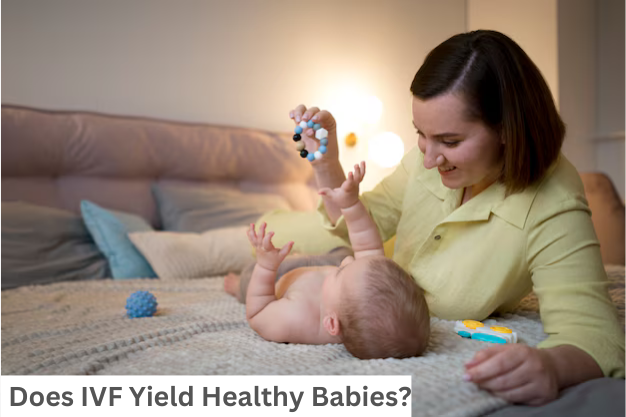Does IVF Yield Healthy Babies?
In Vitro Fertilization (IVF) has revolutionized the landscape of reproductive medicine, offering hope to countless couples struggling with infertility. This complex process involves retrieving eggs from the woman's ovaries, fertilizing them with sperm in a laboratory setting, and then transferring the resulting embryos into the uterus.
While IVF has been instrumental in helping many individuals realize their dream of parenthood, a common question that often arises is: Does IVF yield healthy babies? Let's delve into this topic and explore the factors that contribute to the health of IVF babies.
The Health of IVF Babies: A Closer Look
Research Findings: Numerous studies have consistently demonstrated that IVF babies are generally as healthy as those conceived naturally. Extensive research has shown no significant differences in the physical or mental development of children born through IVF compared to their naturally conceived counterparts.
Key Factors Affecting Health: The health of an IVF baby is influenced by several factors, including:
- Maternal Age: As a woman's age increases, so does the risk of having a child with chromosomal abnormalities. This applies to both IVF and naturally conceived pregnancies.
- Genetic Factors: The genetic health of the parents plays a significant role in the health of their offspring, regardless of the conception method.
- Multiple Pregnancies: IVF often involves the transfer of multiple embryos to increase the chances of success. However, multiple pregnancies carry higher risks for both mother and babies.
- IVF Procedure Itself: The IVF process itself does not pose any inherent risks to the health of the baby. However, the medications used during the treatment cycle can sometimes have minor side effects.
Dispelling Misconceptions
There are several misconceptions surrounding IVF and the health of IVF babies. Let's clarify some of them:
IVF Babies Are More Likely to Have Birth Defects: This is not supported by scientific evidence. In fact, studies have shown that the rates of birth defects are similar in IVF and naturally conceived babies, when factors like maternal age and genetic predisposition are taken into account.
IVF Babies Are More Prone to Developmental Delays: There is no scientific basis for this claim. IVF babies typically develop at the same rate as naturally conceived children.
IVF Babies Are More Likely to Have Long-Term Health Issues: Research has not found any significant long-term health problems associated with being born through IVF.
The Importance of Pre-Implantation Genetic Testing (PGT)
Pre-implantation genetic testing (PGT) is a valuable tool that can be used in conjunction with IVF to assess the genetic health of embryos before they are transferred into the uterus. This technology can help identify embryos with certain genetic conditions, allowing couples to make informed decisions about which embryos to transfer.
The Role of a Fertility Clinic
Choosing the right fertility clinic is crucial for maximizing the chances of a successful IVF cycle and having a healthy baby. At New World Fertility Centre in Delhi, our team of experienced professionals is dedicated to providing personalized care and utilizing the latest advancements in reproductive technology. We prioritize the well-being of our patients and their potential children, ensuring that every IVF cycle is conducted with the utmost care and attention to detail.
Conclusion
IVF has made significant strides in helping couples overcome infertility and build families. While the health of an IVF baby is influenced by various factors, research consistently demonstrates that IVF babies are generally as healthy as those conceived naturally. By understanding the factors that contribute to the health of IVF babies and working closely with a reputable fertility clinic like New World Fertility Centre, couples can increase their chances of having a healthy and happy child.
Frequently Asked Questions (FAQs)
1. Is IVF safe for babies?
Yes, IVF is generally safe, and many babies born through IVF are healthy. Extensive research indicates that while there may be slightly increased risks for certain conditions, the vast majority of IVF pregnancies result in healthy babies.
2. Are there any health risks associated with IVF for the baby?
Studies show that babies conceived through IVF may have a slightly higher risk of preterm birth and low birth weight. However, these risks are often manageable with proper medical care. It’s important to have regular check-ups and follow the guidance of your fertility specialist.
3. What role does genetic screening play in IVF?
Preimplantation genetic testing (PGT) is an option available during IVF. PGT allows us to screen embryos for genetic abnormalities before transfer, which significantly reduces the risk of hereditary conditions and increases the chances of a healthy pregnancy. This option is offered at New World Fertility Centre.
4. How does maternal health impact IVF outcomes?
Maternal health factors, such as age, pre-existing medical conditions, and lifestyle choices, can influence the health of the pregnancy and the baby. Our team at New World Fertility Centre works with you to optimize your health before and during the IVF process, providing personalized advice on nutrition, exercise, and overall well-being.
5. What support does New World Fertility Centre provide during IVF?
At New World Fertility Centre, we prioritize the health of both the mother and the baby throughout the IVF journey. Our experienced team closely monitors every step of the process, ensuring that potential issues are addressed promptly. We provide compassionate care and support from your initial consultation to the birth of your child.

 Oct-07-2024
Oct-07-2024